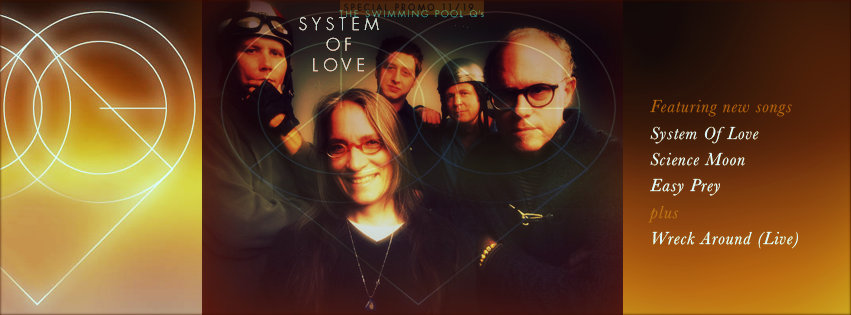System of Love EP by The Swimming Pool Q's- MP3 Album
Deep End Press > News and Observer (1) > News and Observer
The News and Observer/Raleigh, North Carolina
Wednesday, August 29, 2001
Pool Q’s Return
by David Menconi
If you aspire to a career in music, there are plenty of how-to books on the subject. But perhaps the sagest advice on the subject can be found in an unlikely place- a collection of mostly academic critical essays called, Present Tense: Rock & Roll and Culture, edited by Anthony DeCurtis (Duke University Press, 1992.)
The closing piece in Present Tense is called “Living By Night in the Land of Opportunity: Observations on Life in a Rock & Roll Band” (which can be read online at www.swimmingpoolqs.com) Written by Jeff Calder, it recounts the career-track misadventures of his Atlanta rock band the Swimming Pool Q’s (who come to the Brewery on Saturday for their first Triangle performance in more that a decade.) And it gives you the single most valuable nugget of wisdom you’ll need to survive the music industry: Nobody knows anything.
“Living By Night” also gives you a good feel for the music of the Swimming Pool Q’s, one of the more underrated bands to emerge from the South during the late ‘70s new-wave era.
The Q’s fit in rather neatly alongside their Georgia peers the B-52’s and Pylon. But the Q’s were always a lot weirder and darker, with a writerly literary sensibility to go with the jittery Captain Beefheart-style skronk they played. Songs like “Rat Bait” and “Model Trains (Are Better Than Rock & Roll)” were pile-driving dadaist vignettes, simultaneously absurd, disturbing and a ton of fun.
And for the first time in years, it’s possible to see and hear the Swimming Pool Q’s as well as read about them. The group is back in circulation to a splendid new reissue of its 1981 debut album, The Deep End (dB Records). Along with putting the 11 song album on CD for the first time, the reissue adds a dozen bonus tracks plus admirably detailed historical liner notes by Calder.
Don’t call this a reunion, however.
“We never really disbanded.” Calder says. “We always continued to play, although we did stop touring during the 1990’s. It seemed like the whole regional scene that had sustained the band began to change at the club level, to become not as hospitable to a band like us.”
While the Pool Q’s haven’t played much outside their hometown the last decade, they have been working on an album called The Royal Academy of Reality, their first new record since 1989’s World War 2.5 A sprawling record eight years in the making, The Royal Academy of Reality adds unexpected sonic elements-including hammer dulcimer and turntable scratching. Calder himself describes the album as “dense and baroque, requiring a level of concentration that I don’t know anybody has time for anymore.”
The album is more or less done, although it needs some tweaking (and could maybe stand to be edited down a bit.) Calder says he would like to get it out by spring. Unfortunately, the chaotic state of the music industry could make that difficult.
“The problem is that the label that’s right for this no longer exists,” Calder says. “Those intermediate labels like Mammoth or Outpost are all gone; that’s absolutely over with. So every label is either enormous or minuscule, and enormous labels just aren’t going to be interested in a band like The Swimming Pool Q’s anymore for a host of reasons. That’s not negative or pessimistic, that’s just the way it is.”
With The Royal Academy of Reality in limbo, the Q’s focus is on The Deep End reissue for now. Two decades later, the album holds up as more than a period piece, combining Calder’s braying voice with Anne Richmond Boston’s purer tones over driving whipsaw rhythms. The Q’s made more accessible albums after signing to A&M Records in 1984; but for oddball idiosyncratic charm, they never really topped The Deep End.
“Twenty years later, there’ve been so many changes in the way records are made,” Calder says. “That was a live record with a few overdubs by a band that was pretty tight, and I can appreciate it more now that I could 10 years ago. People who have heard it say it has this quality of freshness, sounds like it was recorded yesterday. Well, not really, that’s not the way people made records yesterday.
But I think a lot of artists are embarrassed by their past. For whatever reason, that was never the case for us. As a lyricist, I might not have the same sensibility as I did at that time. But it’s still very challenging music to play.”






